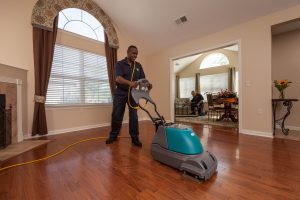Flooring in commercial buildings receives heavy foot traffic throughout the day. Equipment may be accidentally dropped, and spills are a common occurrence. The pressure a commercial floor undergoes each day requires it to be extremely durable. Typical scenarios like these necessitate that a commercial floor be cleaned much differently than floors found in private residences.
Why clean a commercial floor? Businesses benefit by maintaining a clean environment. A sense of pride in employees goes a long way, as does impressing customers, when it comes to keeping a spotless workplace. Plus, spills lead to slips, falls and similar workplace injuries. Business owners can prevent liability by maintaining a dry, clean floor.
Several variations in commercial hard floors exist. Tile floors are low-cost, sturdy and popular in commercial properties. Concrete floors offer exceptional durability, especially in high-traffic areas. Concrete flooring also offers easy maintenance. Commercial hardwood floors are aesthetically pleasing while being strong enough to withstand heavy foot traffic, spills and even dents. However, commercial hardwood flooring requires extra maintenance.
Clean Tile Floors
Cleaning tile floors is a simple process, requiring nothing more than water, a bucket, a neutral cleaner, mop and floor fan. Be sure to avoid harsh cleaners, as the chemicals can strip away the finish and leave behind a dull look.
First remove all large debris by vacuuming the entire area. Remove any obstacles, like trash bins, to allow ample room for a thorough cleaning of all tiles.
Add one ounce of the neutral cleaner per gallon of water. Scrub the entire surface of the tiles with the cleaning solution. Once the area is sparkling clean, set up the floor fans or air movers to completely dry out the area. A good rule of thumb is to allow the fans to run at least 30 minutes to allow the floor to thoroughly dry and to prevent accidental slips and falls.
Stubborn stains and unsightly scuffs can be effectively removed from tile floors. Increase the amount of cleaner to two to four ounces per gallon of water. More concentrated cleaners will work, but harsher chemicals give the floor a greyed appearance. Plus, try lifting stains by scrubbing or mopping in a figure eight pattern rather than a repetitive side to side motion.
Clean Concrete Floors
Concrete floors are the easiest to clean but require daily maintenance. A dry mop or vacuum should be used every day to remove dust and dirt particles that are abrasive to the floor. When mopping with water and a neutral-pH floor cleaner, be aware that the porous surface of concrete makes the drying process extremely important. Water and liquid cleaners can get absorbed into even a sealed concrete floor without ample drying procedures.
Using a mop and neutral cleaner, cleanse the concrete floor. Unlike cleaning a tile floor, the cleaner used to wash concrete floors should be left for a few minutes on the concrete until the chemicals start to break down the dirt and grease. Experts advise cleaning a few small areas of the concrete flooring at a time, to prevent the cleaning solutions from drying into the surface of the concrete.
Once the concrete floor is wet mopped with the neutral cleaner, the cleaning solution should be rinsed away. Use a bucket of clean water and a clean mop head to wash away any leftover cleaner from the concrete. Set up powerful air movers to thoroughly dry the concrete flooring.
Business owners should seal the concrete floor to make cleaning up stains and spills easier. Property managers may even consider investing in an automatic floor scrubber, especially if the concrete flooring covers a large space.

Clean Hardwood Floors
Hardwood floors are not only stylish, but they require routine cleaning to maintain an attractive appearance. Plus, regular cleanings lengthen the life of the hardwood floor.
Cleaning a hardwood floor requires a mop, neutral cleaner, bucket, air mover and vacuum. Similar to the first step in cleaning a concrete floor, vacuum up any large dust particles or debris along the hardwood flooring. Dirt particles and grime can easily scratch or damage a hardwood floor’s surface.
The hardwood flooring should be mopped with the solution of neutral cleaner and water. Once the floor is clean, lift the cleaner with a second round of clean water and a rinsed mop. Dry the area with a floor fan or air mover. A towel may be used to dry the hardwood floor, but the fibers may lead to scratches or scraping along the surface of the floor.
A sealant or finish applied to the hardwood floor can extend the floor’s lifespan. Plus, a sealant can provide a shiny appearance to the floor. Be careful when using a harsh chemical to cleanse a finished hardwood floor, since inappropriate cleaning methods will strip the floor of the finish.
Business owners should invest in regular cleanings to maintain the look and cleanliness of the commercial hard floors in their building. Professional cleanings are ideal to help upkeep any type of hard floor. ServiceMaster Kwik Restore offers quality commercial floor cleanings to both businesses and residential settings that feature hard floors. We utilize eco-friendly cleansers and products to safely restore the look and feel of your business’ or home’s floors.
ServiceMaster Kwik Restore specialists will arrive onsite to assess the floor and determine the right cleaning method. Pre-treatment is applied to stains and unsightly spots. A thorough cleaning is performed, after which the professionals tackle the baseboards and corners. Powerful air movers are strategically placed throughout the area to completely dry the floors. Business and home owners have the option to finish or reseal the floors to add a layer of protection.
Contact ServiceMaster Kwik Restore to handle every type of hard floor surface cleaning, whether the cleaning is in your home or place of business. The trusted floor cleaning services from ServiceMaster Kwik Restore are reliably offered to businesses and residential properties in the Cary, Elgin and Kenosha communities.

